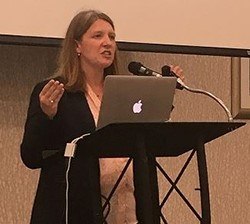UA Economist: Job and Housing Markets Hot in NWA
by May 27, 2016 3:36 pm 242 views

Things are hot in Northwest Arkansas, and the rest of the state is doing well too, University of Arkansas economist Kathy Deck reported at the Quarterly Business Analysis Luncheon on Friday at the Hilton Garden Inn & Conference Center in Fayetteville.
Deck is director of the Center for Business and Economic Research (CBER) at the UA’s Sam M. Walton College of Business in Fayetteville.
The luncheons are a partnership between the CBER and the Northwest Arkansas chambers of commerce.
Deck said the unemployment rate is 2.9 percent in Northwest Arkansas and 3.9 percent statewide, faring better than the national unemployment rate, which has hovered around 5 percent
“Things are not just good here, but everywhere,” she said. “Central Arkansas is pulling its weight.
“It’s where most of the people are. We need central Arkansas to perform well, and the good news is its core industries are performing well, and that makes a difference across the state,” Deck said.
The Jonesboro metro area is also thriving, although Fort Smith is still struggling to recover following the Whirlpool plant closing in 2012.
Statewide, the labor force is growing much faster than the national force, not just in metro areas, but in rural areas as well.
Arkansas is breaking the cycle of recent history, by outpacing the U.S. in job growth.
“And of course, we continue to see Northwest Arkansas just do fantastic from a growth perspective,” Deck said.
“The number of houses sold is on fire,” with numbers reaching 2007 levels, she said, adding that the added activity does not necessarily mean the economy is in danger of a crash.
“We have a lot more people than we did in 2007, so it doesn’t mean ‘bubble’ just because there’s a lot of activity,” Deck said.
The single-family and multifamily construction going on is a positive, she said.
“Residential construction has nice multiplier effects for the rest of the economy. People buy things to fill up those new homes; people buy things to fix up their new homes,” she added.
At the same time, the home ownership rate “doesn’t look like recovery from a recession,” Deck said.
And she expressed concern with construction’s disproportionate piece in the economy, but added that it is not at an alarming level.
She expressed satisfaction with growth in the business and professional services, as well as the trade, transportation and utilities industries.
“That’s bread and butter for us,” she said, and it makes her “worry less” about the size of the construction industry.
Deck also pointed to poor performance in the energy sector and manufacturing.
The manufacturing industry is struggling because of economic tough times internationally, and low gas prices have exacerbated the problem.
Whereas low gas prices helped the manufacturing industry in previous times, there was a “very different pattern from history” in recent months, Deck said, because much of the manufacturing industry was serving the energy sector by building pipelines and infrastructure.
“The effect was underestimated by economists,” she said.
However, Deck expects modest improvements to the manufacturing industry during the next three to six months, due to an improving local economy and stabilized energy industry.
Other stats Deck pointed to include the continued rise in student debt and the National Federation of Independent Business’ Small Business Optimism Index showing levels that have not turned to pre-recession periods.
As for consumer sentiment: “Consumers right now feel pretty darn good … and why shouldn’t they?” Deck said.
Arkansas outperformed the Oklahoma and Missouri in the latest Arvest Consumer Sentiment Index, she said.
In terms of keeping an eye on a bubble that could lead to recession, Deck said: “I’m not one who subscribes to the idea that there is a disproportionate risk for recession right now. I believe there has to be a good reason.”
“When we say, ‘What is the bubble in right now, the aspect of the economy that is out of balance?’ I don’t believe that is easy to identify right now,” Deck said. “So, I am going to be in the camp of continued, plodding along, we wish it was faster but it’s not, growth throughout the rest of 2016 and into next year.”
